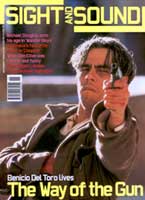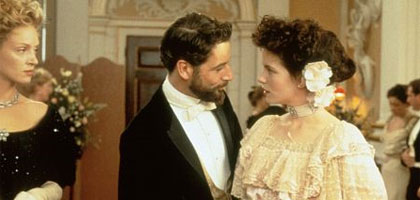
The Golden Bowl
UK/France/USA 2000

Reviewed by Ginette Vincendeau
Synopsis
Our synopses give away the plot in full, including surprise twists.
Italy, 1903. Impoverished Italian prince Amerigo is to marry American heiress Maggie Verver, a schoolfriend of his mistress Charlotte whom he must now abandon. Charlotte comes to London for the wedding and, unbeknown to Maggie, convinces Amerigo to accompany her to buy a present for his new bride. They find a golden bowl but Amerigo pronounces it flawed and rejects it.
A few years later, Amerigo and Maggie have a baby boy, and alternate between their house in Italy and the English country home of Maggie's father Adam Verver, a rich industrialist and art collector who plans to open a museum in the US. Verver marries Charlotte. Amerigo and Charlotte resume their affair, to the horror of London society, and provoke guilt in Fanny, a family friend who engineered Amerigo's marriage to Maggie despite knowing about his previous affair with Charlotte. Meanwhile Charlotte is jealous of the bond between her husband and Maggie. Amerigo and Charlotte spend a weekend together in Gloucestershire, arousing Maggie's suspicions. When she coincidentally buys the same golden bowl for her father, she finds out about the affair and confronts Amerigo who swears his love for her. She secretly engineers for her father to take Charlotte away. He agrees and takes her back to the US with his art collection.
Review
The Golden Bowl is the latest in a line of heritage productions by director James Ivory, screenwriter Ruth Prawer Jhabvala and producer Ismail Merchant. It also belongs to the growing canon of Henry James adaptations, including The Europeans (1979) and The Wings of a Dove. No doubt it will be judged by literary-minded critics in terms of its 'faithfulness' to the book. Not having read the novel, my own line of enquiry was simpler: how good a movie is it?
Heritage cinema is frequently used by film critics as a term of abuse, which is odd since the genre displays intrinsically cinematic qualities: spectacular mise en scène, painstakingly researched decors and objects, wonderful performances by stellar casts. From this perspective, The Golden Bowl scores highly, if not all the time. With lush locations ranging from an Italian palazzo to a great English country house, the film is visually exquisite; as in the early 'cinema of attractions', each new setting induces wonder, not just at its beauty but also at its scale and grandeur. Moreover such display is not there for the sake of it - it plays an active part in the narrative. Dealing with the consequences of Charlotte's affair with Amerigo, an impoverished Italian nobleman who marries Maggie, daughter of rich American industrialist Verver, this is a story about the way emotions are bound to, and driven by, property and wealth. Amerigo's crumbling palazzo is the narrative mainspring, since he marries Maggie to preserve it. At the end, Verver takes his art treasures, including Charlotte, back to America.
It is thus appropriate to the genre that the key object in the story - the golden bowl, a piece of antique crystal - should be the driving metaphor. As Maggie says when she finds out about Amerigo and Charlotte's affair, "I want happiness without a hole in it, a bowl without a crack." As well as weaving an intricate thread between objects and feelings, the film makes connections between mise en scène and narrative, representation and reality. It opens with a stylised vignette involving Amerigo's 16th-century ancestors, a tale of jealousy which acts as a mise en abyme for the rest of the story. It ends with flickering black-and-white archive footage of early 20th-century America. The Golden Bowl thus encases its characters' fate within a double trajectory: that of the march of time and that of technologies of representation. Throughout, key narrative moments are told through self-conscious references to art: Verver woos Charlotte by showing her his Raphael drawings, her affair is revealed to London society at a fancy-dress ball and Amerigo's renovation of his castle parallels his growing attachment to Maggie. The revelation of the adulterous liaison is linked to the golden bowl, but the clinching evidence is a photograph of Charlotte and Amerigo in fancy dress ("Are you comfortable?" the photographer asked them, "Then I shall expose!"). There are slides, tableaux vivants, ballets, films within the film, a hall of mirrors.
And yet despite the sophistication of its spectacle, The Golden Bowl fails to be fully satisfying. The story drags at several points, notably in the initial exposition and then towards the end. And while the ambiguities of the relationships between Amerigo and Charlotte and between Maggie and her father are cleverly conveyed, the Verver-Charlotte dynamic feels underwritten. Even more strikingly, the friendship between the two women remains shadowy.
Performances are a mixture of the wonderful and the weak. Uma Thurman and Nick Nolte are typically brilliant (though there is not enough of Nolte's Verver, and Thurman, while perfect as the imperious Charlotte of the first part, is less credible as the forsaken mistress at the end). Kate Beckinsale as Maggie is fine in a thankless part. The problem is Jeremy Northam, underwhelming as the aristocratic Latin lover with a dodgy Italian accent. Surely, you're left thinking, Italy has actors as well as palazzi. Northam's weak performance unbalances the film as it becomes increasingly difficult to see why he should be the object of such passions. These reservations however do not invalidate the overall accomplishment of the film. Like its eponymous artefact, The Golden Bowl is flawed - yet it remains an object of great beauty and elegance.
Credits
- Director
- James Ivory
- Producer
- Ismail Merchant
- Screenplay
- Ruth Prawer Jhabvala
- Based on the novel by
- Henry James
- Director of Photography
- Tony Pierce-Roberts
- Editor
- John David Allen
- Production Design
- Andrew Sanders
- Music
- Richard Robbins
- ™ Golden Bowl Productions Ltd.
- Production Companies
- Merchant Ivory Productions and TF1 International present in association with
- Miramax Films a Merchant Ivory film
- Executive Producers
- Paul Bradley
- Richard Hawley
- Italian Associate Producer
- Fabrizio Mosca
- Production Co-ordinators
- Anna Hall
- Penelope Perry
- Italy:
- Barbara Ruggeri
- Production Managers
- Sarah Bradshaw
- Italy:
- Marcantonio Borghese
- Key Location Manager
- Christian McWilliams
- Location Manager
- J.J. Hook
- Assistant Directors
- Christopher Granier Deferre
- Adrian Toynton
- Paula Turnbull
- Emma Horton
- Anya Gripari
- Italy:
- Filippo Fassetta
- Script Supervisors
- Beverly Winston
- Italy:
- Giorgia Onofri
- Casting
- Celestia Fox
- Italy:
- Shaila Rubin
- 2nd Camera Operator
- Colin Corby
- Steadicam Operator
- Peter Cavaciuti
- Digital Effects
- Digital Film, London
- Art Directors
- Lucy Richardson
- Italy:
- Gianni Giovagnoni
- Set Decorators
- Anna Pinnock
- Italy:
- Cinzia Sleiter
- Draughtsman
- Martin Foley
- Costume Designer
- John Bright
- Wardrobe
- Supervisor:
- Janet Tebrooke
- Mistress:
- Laura May
- Master:
- Dan Grace
- Make-up
- Designer:
- Amanda Knight
- Artist:
- Trefor Proud
- Researcher/Make-up & Hair Co-ordinator
- Elizabeth Lewis
- Hair Designer
- Carol Hemming
- Hairdresser
- Zoe Tahir
- Title Design
- Frameline
- Optical Effects Producer
- Susi Roper
- Opticals
- Peerless Camera Company
- Solo Piano
- Simon Chamberlain
- Solo Cello
- Philip De Groote
- Solo Saxophone
- Phil Todd
- Conductor
- Harry Rabinowitz
- Leader
- Marcia Crayford
- Orchestral Arrangements
- Geoffrey Alexander
- Recordist
- Kirsty Whalley
- Soundtrack
- "Moonstruck"; "Sarabande" from "Pour le piano"; "Wall Street Rag"
- Choreography
- Karole Armitage
- Sound Mixers
- David Stephenson
- Italy:
- Gilberto Martinelli
- Re-recording Mixers
- Robin O'Donoghue
- Richard Street
- Dominic Lester
- Recordist
- Nigel Bennett
- Supervising Sound Editor
- Nigel Mills
- Dialogue Editor
- Nina Hartstone
- ADR Editor
- Phillip Alton
- Foley Editors
- Peter Holt
- Martin Cantwell
- Cast
- Kate Beckinsale
- Maggie Verver
- James Fox
- Colonel Bob Assingham
- Anjelica Huston
- Fanny Assingham
- Nick Nolte
- Adam Verver
- Jeremy Northam
- Prince Amerigo
- Madeleine Potter
- Lady Castledean
- Uma Thurman
- Charlotte Stant
- Nicholas Day
- Lord Castledean
- Peter Eyre
- Jarvis, shopkeeper
- Nickolas Grace
- lecturer
- Robin Hart
- Mr Blint
- Daniel Byam Shaw
- Principino at five years
- Francesco Giuffrida
- duke's younger son
- Marta Paola Richeldi
- the duchess
- Rossano Rubicondi
- duke's older son
- Mattia Sbragia
- the duke
- Billy Monger
- Principino
- Pauline Rainer
- nursemaid
- Susan Gutfreund
- vivacious guest
- Arturo Venegas
- Italian ambassador
- Raymond Green
- photographer
- Anthony Bevan
- butler
- Neville Phillips
- man talking to Castledean
- Paul Bradley
- executioner
- Lucy Freeman
- Lucy Moncreif
- Phillip Tabor
- William Davenport
- Catherine Aldrich
- Isabel de Pelet
- Richard MacRory
- Caroline Burnaby-Atkins
- guest at Fawnss
- The ballet
- Piers Gielgud
- Pasha
- Antonia Franceschi
- 1st queen
- Philip Willingham
- slave
- William Dignon
- little prince
- Ray Souza
- Leanne Codrington
- Amy Bailey
- Michaela Burgess
- Simon Humphry
- Michela Meazza
- Stephen Hughes
- Tippi Maravala
- dancers
- Certificate
- tbc
- Distributor
- Buena Vista International (UK)
- tbc feet
- tbc minutes
- Dolby Digital
- In Colour
- Prints by
- Technicolor UK
- 2.35:1 [Panavision]
